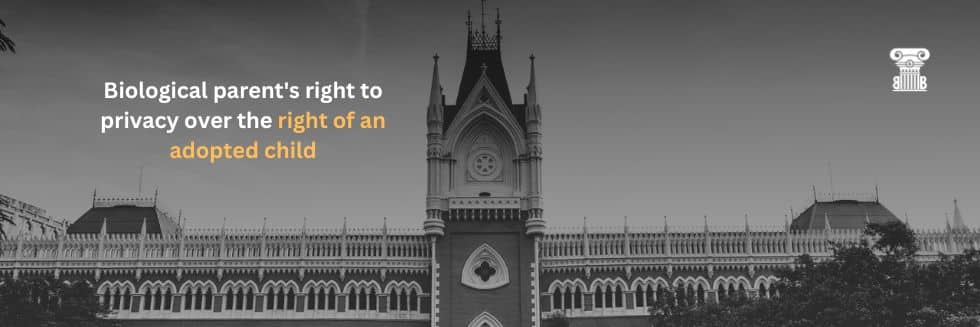In a recent ruling, the Calcutta High Court, in the case of Fabian Ricklin, alias Ranabir Vs. State of West Bengal & Ors., underscored the primacy of a biological parent’s right to privacy over the right of an adopted child to trace his or her biological origins.
The Case Background
The case in question involved a Swiss citizen who sought to uncover his biological roots. The petitioner approached the Kerala High Court, requesting access to the relinquishment deed executed by the adoption agency that had facilitated his adoption. Born in 1988 to an unwed mother who subsequently disappeared, the petitioner was adopted by Swiss parents. His biological mother had expressed her desire to sever all ties with him at the time of his adoption.
Despite the petitioner’s plea, the High Court dismissed the case.
The Court’s Observations
Justice Sabyasachi Bhattacharya of the Single Bench observed that the right to privacy of a biological parent, particularly an unwed mother who had given up her child for adoption and subsequently disappeared, would take precedence over the child’s right to trace his or her biological origins.
The court further noted that Section 47 of the Adoption Regulations, 2022, explicitly states that an adopted child’s rights should not infringe upon the biological parents’ right to privacy.
The court acknowledged the inherent human desire to understand one’s roots. This desire is an integral part of our existence and contributes to leading a fulfilling life. However, the court argued that the rights to privacy and identity protection of an adoptee’s biological parents are more fundamental, as these rights safeguard the biological parents’ very survival.
Relevant Legal Provisions:
Right to Privacy
In today’s world, the right to privacy is considered one of the most essential human rights. It is protected as an integral part of the right to life and personal liberty under Article 21 of the Constitution of India, 1950 (COI).
Privacy is the reservation of a private space for an individual, often described as the right to be let alone. This concept is rooted in the autonomy of the individual.
In the landmark case of K.S. Puttaswamy v. Union of India (2017), the Supreme Court held that privacy forms the bedrock of all liberty. It is within the realm of privacy that an individual can determine how best to exercise liberty. Individual dignity and privacy are inextricably linked, forming a pattern woven from a thread of diversity into the fabric of a plural culture.
Adoption Regulations, 2022
“The Ministry of Women and Child Development introduced the Adoption Regulations, 2022, to streamline the adoption process. Section 47 of this Regulation pertains to root search and stipulates the following:
- If the biological parents have specifically requested anonymity at the time of the child’s surrender, the Specialized Adoption Agency or the District Child Protection Unit, as the case may be, must obtain the biological parents’ written consent before divulging any information.
- In cases of root search by older adoptees, the concerned agencies or authorities, including the Authorized Foreign Adoption Agency, Central Authority, Indian diplomatic mission, Authority, State Adoption Resource Agency, District Child Protection Unit, or Specialized Adoption Agency, must facilitate the adoptee’s root search when contacted.
- Individuals above eighteen years can apply independently online, while children below eighteen years must apply jointly with their adoptive parents to the Authority seeking facilitation of root search.
- In cases where the biological parents deny the request or cannot be traced in surrendered cases, the reasons for such denial or non-traceability must be clearly stated.
- The regulations explicitly prohibit a third party from conducting a root search. The agencies or authorities involved are instructed not to disclose any information concerning the biological parents, adoptive parents, or the adopted child to the public.
- The regulations further emphasize that an adopted child’s rights should not infringe upon the biological parents’ right to privacy. This provision underscores the importance of maintaining the confidentiality of the biological parents, particularly in cases where they have chosen to remain anonymous.”
Conclusion
In conclusion, the case of Fabian Ricklin, alias Ranabir Vs. State of West Bengal & Ors., serves as a significant legal precedent in the realm of adoption and privacy rights. It underscores the delicate balance between an adopted child’s inherent desire to trace their biological origins and the fundamental right to privacy of the biological parents. The ruling reiterates the importance of respecting the privacy and identity of biological parents, particularly in cases where they have chosen to remain anonymous. The Adoption Regulations, 2022, further reinforce these principles, ensuring that the rights of all parties involved in an adoption process are respected and protected. This case is a testament to the evolving nature of privacy rights in the context of adoption, highlighting the need for a nuanced approach that respects the rights and wishes of all parties involved.
This article is written and submitted by Devam Krishnan during his course of internship at B&B Associates LLP. Devam is a 4th year year B.A.LL.B (Hons.) student at NUSRL, Ranchi.








